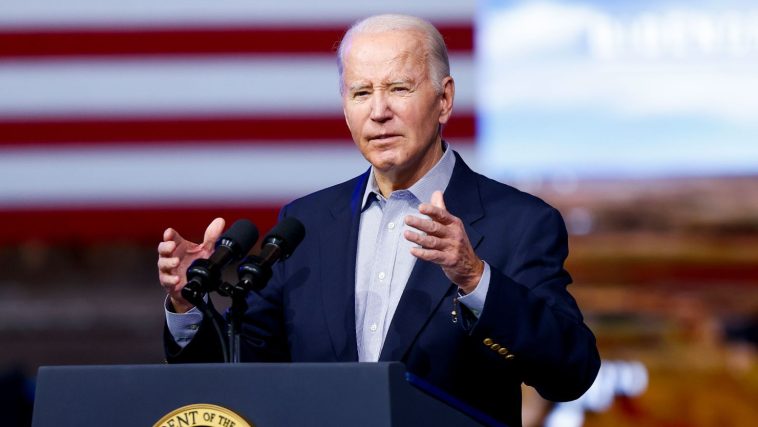Ahead of the 2024 presidential election, it appears that the Drug Enforcement Administration (DEA) under President Joe Biden’s administration is gearing up to alter their stance on marijuana. Their reported course of action would realign it from its current status as a Schedule I drug, a classification that places it alongside dangerous substances such as heroin and cocaine. This proposed shift, put forth by Attorney General Merrick Garland, steers towards a more nuanced view on this controversial substance.
This modification wouldn’t imply outright legalization of marijuana for recreational use. Nevertheless, it would move it to a Schedule III classification. The import of such a change is that marijuana could become attainable through a prescription. As it stands, this represents a compromise between staunchly conservative and more liberal views about its regulation and use.
Yet, before the DEA can implement this modification, the White House Office of Management needs to review and endorse it. Following this, the proposed change would be open for public comment. This transparent process ensures that no sudden action is taken without the voice of the people being heard, a cornerstone of democratic practice and consistent with conservative values of stability and status quo.
Assuming a smooth course of public commentary, the proposal will subsequently face evaluation by an administrative judge. Only after this scrutiny would the DEA codify the rule. This step-by-step approach demonstrates judicious decision-making corresponding with conservative perspectives that value tradition, process, and a thoughtful articulation of the law.
Analyzing this proposed change, it appears that one potential motive behind it could be political calculation. It’s reported that President Biden might be eyeing specific demographics where his acceptance remains questionable. Reclassifying marijuana in a way that lands between outright prohibition and unrestricted legalization may be part of a strategy to appeal to those groups.
Beyond Washington, this proposal has kindled varied reactions throughout the nation. From governmental bodies to everyday citizens, the responses span the gamut between approval and discontentment. This mixed feedback underlines the fact that this is a complex, contentious issue affecting people at all levels, from local communities to the federal government.
Rule changes of this nature carry implications that extend beyond the policy itself. There are repercussions that could ripple through societal, cultural, and legal frameworks. And it’s evident that voices from all ends of the spectrum need to be heard and considered in order for a sustainable decision to be made.
From the heartland, Montgomery County, Alabama, Sheriff Derrick Cunningham voiced a sentiment that reflects a more traditional perspective. Contrary to the view that this reclassification might pave the way for more widespread use, the Sheriff expressed a more cautious standpoint. He firmly stated that the rule change was not tantamount to ‘opening up the door for it.’
Sheriff Cunningham moreover echoed a common conservative concern about marijuana as a ‘gateway drug.’ He argued that this initial step with marijuana often leads to experimentation with harder, more dangerous substances. His position serves as a reminder that this debate involves not only policy and politics but also societal well-being and public safety.
While this proposal tends to demonstrate the flexibility of the Biden administration, conservatives would argue for a less-hasty approach to public policy. Any change must be measured carefully against potential risks and trade-offs to ensure that it won’t lead to unforeseen problems down the line.
As the administration grapples with this contentious issue, conservatives demand the consideration of a broader picture encompassing societal and legal considerations. In essence, a middle-of-the-road approach might seem appealing to bridge the gap between polarized viewpoints.
Nevertheless, the question remains whether this proposed realignment of marijuana’s classification really addresses those deeper concerns or simply smooths over surface tensions. Substance regulation is a significant topic that requires balanced judgement and dealing with substance misuse problems need to be at the forefront of any policy decision.
While there is a broad consensus for reform in marijuana laws, the extent and the form of the change are subjects to intense debate. Even amongst conservatives, there are diverse viewpoints that reflect the complexity of the issue. As we approach 2024, the conversation surrounding marijuana and its classification shows no sign of slowing down.
In the end, the proposal underlines the importance of dialogue and democratic decision-making. It serves as a reminder of the need to listen, compromise, and navigate the path ahead with wisdom and balance. As with many social issues, there is no one-size-fits-all solution to the regulation of marijuana.
Navigating such contentious terrain requires prudence, respect for tradition, and ample care for societal impact – core conservative principles that many would argue should guide this decision. As such, the ultimate outcome of this debate will say much about the role of these principles in policy decisions moving forward.
In the coming months, this dialogue will continue to unfold. It will demand the attention of not just politicians in the Capitol, but also stakeholders across the United States. As conversations evolve and ideas grow, the goal remains the same: to arrive at a decision that respects the law, tradition, and the needs and wants of the American people.


